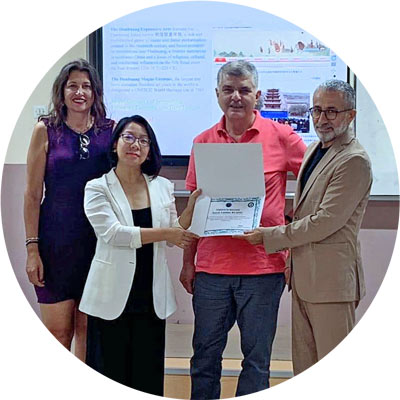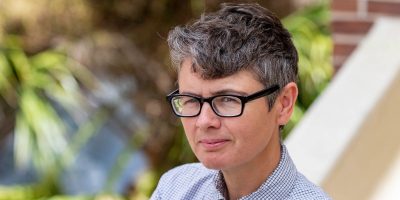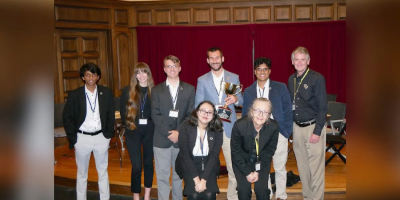
The Department of Philosophy includes BA programs in philosophy, humanities and cultural studies, and religion and cultural studies, as well as minors in these areas and a minor in cognitive sciences. We also have an undergraduate certificate in interfaith dialogue and two graduate certificate programs in theoretical and applied ethics and in cognitive sciences. We also contribute to the interdisciplinary undergraduate certificate program in the Department of Writing and Rhetoric centered on artificial intelligence, big data and human impacts.
Through these majors and minors, we serve our own students and students across the university who have interests in exploring the “big questions” and the emerging practical and intractable questions that beg for solutions (examples include environmental concerns, religion and conflict, the ethics of human relationships, etc.) that our disciplines pose or adopt and seek to address. We utilize research methods through which people may investigate the “big” questions that have interested humanity throughout history, and we tackle new and emerging questions and technologies that our contemporary world generates. In the Department of Philosophy, you will find courses about reality, knowledge and the good life, the nature of spirituality and the role of religion and culture in human lives and about the development of human societies and cultures, including our responsibilities to the environment, to each other and to other animals.

Our department has had a highly active year in faculty research. While there is not enough space in this article to list them all, some of the major research productions of our faculty include the publication of four books by professors Cyrus Zargar (2), Lanlan Kuang and Michael Muhammad Knight; several forthcoming books by professors Ann Gleig, Jonathan Barker and Lanlan Kuang; numerous articles and book chapters published by our faculty, and new funded grants for research ranging from the U.S. Army (Stephen Fiore) to faith and health (Christy Flanagan-Feddon) to Asian Humanities (Lanlan Kuang). Faculty have presented their work at many international, national and regional venues of significant note, continuing a long tradition of our department’s faculty being recognized around the world for their expertise and the quality and impact of their work. For example, our faculty have presented their work in professional venues in Europe, Japan, Taiwan, Malaysia, England, Canada, the U.S., Africa and beyond.
Faculty in the department have won several awards this year, including the UCF-based Research Incentive Award (Michael Strawser and Bruce Janz) and Teaching Incentive Award (Derek Green) and Excellence in Undergraduate Teaching (Stacey DiLiberto). Karina Cespedes has been granted a research sabbatical for the 2025-26 academic year, Jonathan Beever was promoted to professor and Stacey DiLiberto was promoted to Associate Lecturer. Our students benefit from the intensive research activity of the department’s faculty – and many of the faculty’s research activities translate into opportunities for students in internships, other high impact courses, and in completed honors theses and acceptance to graduate programs in our fields.
In 2024-25, we welcomed two new tenure-earning faculty: Brooke Rudow (philosophy and humanities) and Em Walsh (medical ethics). In the upcoming year, two assistant professors will join the department: Hunter Gentry (cognitive sciences) and Charles Freiberg (AI, digital humanities, and philosophy of technology). Many of our established faculty and all our new faculty members contribute specifically to the UCF and College of Arts and Humanities strategic plans in their areas established and emerging teaching and research expertise in science, technology, medicine/health, and the ethics of AI, among others. Our department has notable strengths overall in the history of philosophy, cognitive sciences, theoretical and applied ethics, environmental humanities and philosophy (including environmental and animal ethics), a variety of cultural traditions (traditional or classical Western traditions, Asian and Latin American) and religions (Buddhism, Christianity and Islam) and AI and digital ethics. In other words, our department offers a wide variety of practical, theoretical and applied areas of study that are applicable to an even more expansive variety of professions and graduate study.
Our students experience significant levels of success in the Department of Philosophy, regularly completing honors theses and engaging in individualized instruction in research and directed study under the tutelage of experienced faculty. We teach a variety of honors courses, both in the GEP (Introduction to Philosophy and Encountering the Humanities), in Honors Ethics in Biological Science (Em Walsh), a course in Religion and Medicine (Ann Gleig), and in interdisciplinary seminars such as The Allure of Tyranny (co-taught by Chair Nancy Stanlick and Vladimir Solonari from the Department of History), among others. We have internships, study away programs and high impact practice courses in which students can pursue their intellectual passions in all three of our major programs. Our department has a long history (over two decades) of competing in the regional and national ethics bowl competitions held in conjunction with the Association for Practical and Professional Ethics, having won competitions several times. There is even a course offered through the Department of Philosophy with the Burnett Honors College called “Case Studies in Ethics” that is offered every fall. Students in this course participate in the regional ethics bowl competition practice and planning, with some of the students chosen to be UCF’s representatives as a team. This year, our team won first place in the Southeast Regional Bowl, taking them to the 2025 APPE Intercollegiate Ethics Bowl (APPE IEB)® national championship, where they competed against teams from Duke, Stanford, West Point, Georgia Tech and more.
We also regularly engage with the public and the scholarly communities with our department’s Religion and Cultural Studies BA program with its certificate program in interfaith dialogue. Cyrus Zargar and Christy Flanagan-Feddon host disciplinary and interdisciplinary public talks on issues and topics in religion and religious studies every year. Our faculty participate in professional conferences and as invited keynote speakers worldwide, with presentation topics as wide-ranging as issues in Buddhist thought and communities to philosophy of language, and from virtue ethics to ethnographic and aesthetic studies on hunger and malnutrition represented in revolutionary artwork, and from study of the Silk Road to Existentialism – and more.
Graduates in our disciplines often go on to graduate programs and professional work in areas such as law, the clergy, hospital ethics consulting, medicine, teaching, philanthropy, non-profit organizations, entrepreneurial business ventures, management, publishing and performance. We offer our students signature experiences and disciplinary expertise that distinguish our programs and provide our students a world-class educational experience.




